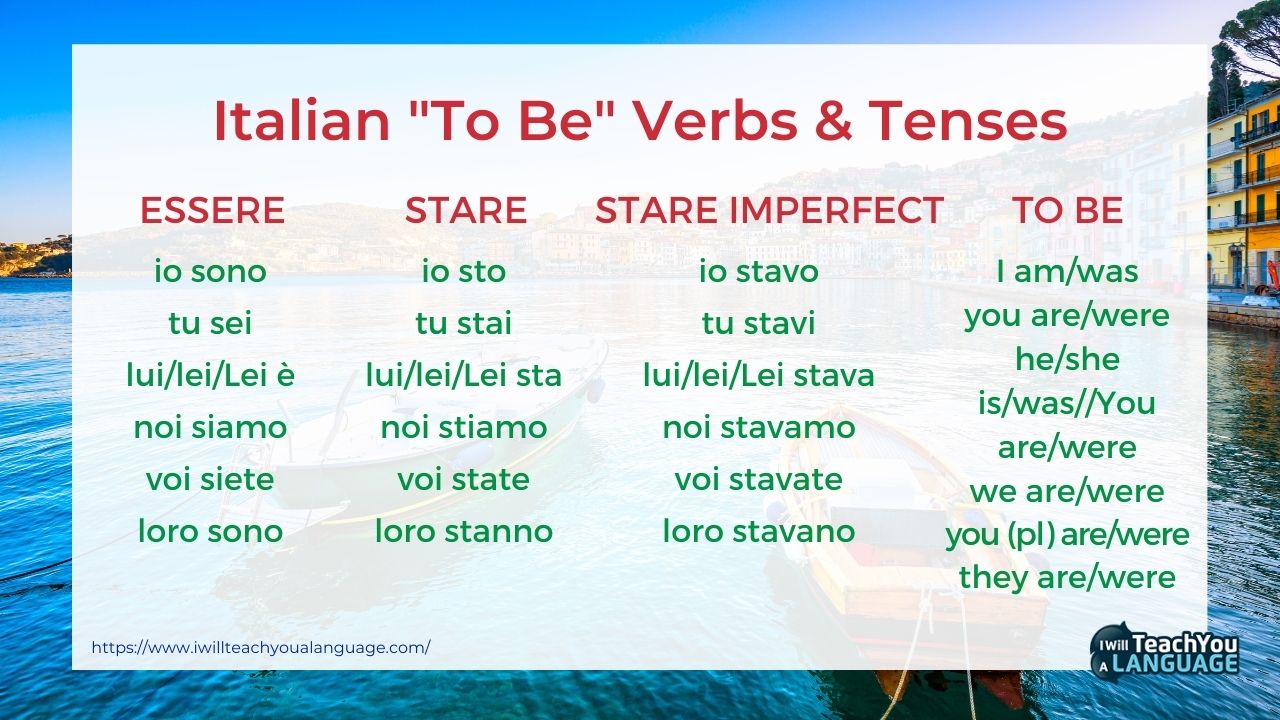
Learning Italian is usually pretty simple compared to say, German with its crazy mass of rules, or a language with a different script, like Mandarin.
But in Italian, there are challenges too. One of these are Italian irregular verbs, meaning those verbs where the forms are different from what they should logically be.
What complicates things a little more is that many of these Italian irregular verbs are the most commonly used, so getting around them is not really an option.
That being said you will often find that even the English translations of the verbs are irregular. Sure, this doesn’t really help you in learning the Italian words because the two languages aren’t irregular in the same way.
But it does show you that every language comes with its own set of exceptions, and it makes you realize that soon, these things will feel like second nature.
By the way, if you want to learn Italian through stories, not rules, my top recommendation for language learners is my Uncovered courses, which teach you through StoryLearning®. Click here to find out more and try out the method for free.
Table of Contents
Irregular Verb # 1 Essere (To Be)

The first Italian irregular verb I'll walk you though, essere, meaning “to be,” is a good example for the irregularity of English as well as Italian.
With essere, the entire word changes depending on how you use it. This isn’t the case with all Italian irregular verbs, since some change only the ending. But be warned that there are many similar cases.
The first example sentence, for the basic form of essere, is a quote by the Red Queen from Alice in Wonderland:
- Hai ragione, è meglio essere temuti che amati. (You are right, it is better to be feared than loved.)
As for the rest: with the exception of “he,” “she,” and the formal “You”, the word essere becomes a variant of sono, or I am:
io sono* (I am)
*a note for the future: the present verb form of the first person “I” always ends in the letter o.
Io [mi*] sono innamorato di te. (I have fallen in love with you.)
*you can include or exclude “mi” without changing the meaning of this supremely important sentence much.
tu sei* (you are)
*Another note for the future: the present verb form for the second person “you” always ends in the letter i.
- Tu sei la mia migliore amica. (You are my best friend. [amica means female friend])
Essere With Lui/lei/Lei & Noi, Voi, Loro
And then here, things get a bit strange:
lui/lei/Lei è (he/she is; You (formal) are)
You’ve got to make sure not to confuse è with e. One means “is,” like in the example above, while e without the accent means “and”. See my post on Italian accents for more on this.
noi siamo (we are)
*Like with the present form for “I”, the verbs for “we” also always end in an o.
- [Noi] siamo la coppia più bella del mondo.* (We are the most beautiful couple in the world.)
*from a famous Italian song by Adriano Celentano
voi siete (you (plural) are)
*Note that the present form of verbs for the plural “you”, as in “you all”, always ends in e.
Here is the previous example sentence in the plural form of you:
- [Voi] siete la coppia più bella del mondo. (You are the most beautiful couple in the world.)
loro sono (they are)
*Like with the present form for “I”, the verbs for “they” also always end in an o.
Let’s see the same sentence, but with them – loro:
- [Loro] sono la coppia più bella del mondo. (They are the most beautiful couple in the world.)

Imperfect Forms Of Essere
In the imperfect tense, things get a little more messy with essere, still:
io ero (I was)
- Un tempo, anche io ero un avventuriero. (At one time, I was an adventurer, too.)
tu eri (you were)
- Tu eri il prescelto!* (You were the chosen one!)
*A quote from Star Wars
- Non eri tu che dovevi partire.* (It wasn’t you who had to leave.)
*from a Vasco Rossi song
lui/lei/Lei era (he/she was, You (fo.) were)
- Lei era diversa. Sembrava che nemmeno poggiasse i piedi per terra quando camminava. (She was different. It seemed like her feet didn’t touch the ground when she walked.)
noi eravamo (we were)
- Noi eravamo d’accordo con loro. (We were in agreement with them/we had agreed [on something] with them.)
voi eravate (you (pl.) were)
loro erano (they were)
Irregular Verb # 2 Stare (To Be)

Now that we’ve gone through “to be,” let’s go to the other “to be.”
Really – the word below, stare, can be used as essere when you want to say you are doing, saying, or thinking (etc.) something right now. Or sometime in the future, or in the past. I promise it’s less complicated than it sounds.
- Stare
- (to be [at a specific moment])
- (to stay) sometimes used in place of “to stand”
Here’s a chart so you can compare the “to be” tenses to their English versions.

Uses Of Stare
The closest thing to it in English are words that end in “-ing,” like swimming or driving. You would say “she swims” when it’s something she does regularly, while “she is swimming” would mean she is doing so right now.
Same with driving, where saying that someone drives would be taken to mean that the person has a driving licence.
You’ll have come across stare from one of the first sentences you have likely learned in Italian:
- Come stai? (How are you?)
And to answer it, you would hopefully have said:
- Sto bene, grazie. (I’m fine, thank you.)
Stare For Location
With stare, you can also say that someone is or was somewhere:
- Laura sta a casa con la febbre. (Laura is at home with fever.)
- Non vuole stare da sola. (She does not want to be alone.)
- Stavo andando a casa sua. (I was on my way to her house.)
If referring to a specific time in the future, you’d say:
- Io starò a casa con lei domani. (I will stay at home with her tomorrow.)
Fun fact: there is no word in Italian for standing, as in “I am standing in the middle of the road.” You can only say you are in the middle of the road, or that you are “on your feet,”: sto in piedi.
Even if all this seems daunting at first, don’t worry too much: with some practice, the irregular forms of essere – and in fact of all Italian irregular verbs — will be easy to master.
To be fair, the next verb, avere, (to have) may not be the best example in its present form, since some of the versions barely have a letter in common with the base word.
Irregular Verb # 3 Avere (To Have)

io ho (I have)
- Io ho un gatto che fa bau e un cane che fa miao.* (I have a cat that goes woof and a dog that goes meow.)
*Notice how, in Italian, the sound the dog makes is written (and said) as bau. It’s one of those unexplainable language quirks that makes little sense, like how in America the main meal is called entrée, or “starter” in French.
tu hai (you have)
- Tu non hai alcun potere qui.* (You don’t have any power here.)
*a little further below, you will see that potere as a verb can also mean “to be able to”.
lui /lei /Lei ha (he/she has; You (fo.) have)
- Lei ha una voce molto bella. (She has/You (fo.) have a very beautiful voice.)
noi abbiamo (we have)
- Noi due abbiamo qualcosa in comune. (We two/the two of us have something in common.)
voi avete (you (pl.) have)
- Voi avete ragione, come sempre. (You are right, like always.)
loro /Loro hanno (they/They (fo. pl.) have)
Imperfect And Present Perfect With Avere
Thankfully, the imperfect goes back to something almost regular: io avevo, tu avevi, lui/lei/Lei aveva, and so on.
It helps to remember that the present perfect is made up of the present form of avere plus the verb, just like with “have” in English, really.
Some examples:
- Hai preso la mia macchina? (Have [you] taken my car?)
- Lei ha detto qualcosa. (She has said something)
- Io ho avuto un incidente. (I have had an accident.)
Irregular Verb #4 Fare (To Do, To Make)

io faccio (I do)
- [Io] faccio fatica a capirti.* (I find it hard to understand you.)
Literally, this sentence would be translated something like “I make fatigue to understand you.”
You do not need to put io at the beginning of this sentence, and can skip it in most others, too. The verb form used after io already makes clear you are talking about yourself, which is not the case in English.
Same thing with tu, which is used more frequently in Italian speech than io, but can be left out very easily. To some extent, all Italian pronouns can be skipped, in fact.
tu fai (You do)
- Tu vuò fà l’americano!* (You want to be an American!)
*This famous song, popularized by the film The Talented Mr. Ripley, is about an Italian who tries to make himself look American. Not textbook Italian, this Neapolitan quote literally means “You want to make the American.”
lui /lei /Lei fa (he/she does, You (fo.) do)
noi facciamo (we do)
- Noi facciamo le nostre fortune e le chiamiamo destino. (We make our [own] fortunes and call them destiny.)
voi fate (you (pl.) do)
loro /Loro fanno (they do)
- Loro fanno finta di volermi bene. (They pretend to care for me; literally: they make pretend to wish me well)
Perfect Forms Of Fare
The present perfect is again irregular, even when compared to the present, but the good news is that the word itself stays exactly the same, fatto:
io ho fatto (I have made)
- [Io] ho fatto un casino! (I’ve made a mess!)
tu hai fatto (you have made)
- Tu hai fatto la scelta. (You’ve made your choice.)
lui /lei /Lei ha fatto (he/she has made, You (fo.) have made)
noi abbiamo fatto (we have made)
voi avete fatto (you (pl.) have done)
loro /Loro hanno fatto (they have done)
- Voi mi avete fatto male. (You’ve hurt me.)
Imperfect Forms Of Fare
Now, the imperfect is the trickier one, here:
- io facevo (I had done, made)
- tu facevi (You had done)
- lui /lei /Lei faceva (he/she has done, You (fo.) had done)
- noi facevamo (We had done)
- voi facevate (You (pl.) had done)
- loro /Loro facevano (they had done)
Irregular Verb #5 Dare (To Give)

One of the stranger Italian irregular verbs, dare gets very, very irregular, but every version is charming, so that makes it a little better.
io do (I give)
- Io ti do il mio numero di telefono. (I [am going to] give you my phone number.)
tu dai (you give)
lui /lei /Lei dà (he/she gives, You (fo.) give)
noi diamo (we give)
- Noi vi diamo il benvenuto (lit. “We give you (pl.) the welcome”, meaning “we welcome you.”)
voi date (you give)
- Datemi un minuto! (Give me a minute!)
loro /Loro danno (they give)

Present Perfect Forms Of Dare
Just like with fare and fatto, and just like in the English translation, the present perfect for the word dare, dato, remains unchanged:
- io ho dato (I have given)
- tu hai dato (you have given)
- lui /lei /Lei ha dato (he/she has given, You (fo.) have given)
- noi abbiamo dato (we have given)
- voi avete dato (you (pl.) have given)
- loro /Loro hanno dato (they have given)
Irregular Verb # 6 Dovere (To Have To, Must)

- Questo è il mio dovere.* (This is my duty.)
As you can see from the example above, dovere, as a noun, can mean duty. And while here, we are talking about the verb form, there are enough instances for that below.
io devo (I have to/I must)
- Io devo andare a casa subito. (I’ve got to go home immediately.)
tu devi (you have to)
- Tu devi fare ciò che ti dico! (You must do what I say!)
lui /lei /Lei deve (he/she has to, You (fo.) have to)
noi dobbiamo (we have to)
- Noi non dobbiamo dimenticarla. (We must not forget her.)
voi dovete (you have to)
loro /Loro devono (they have to)
Irregular Verb # 7 Andare (To Go)

io vado (I go)
- Io vado in giro sempre con la vespa.* (I always go/get around on the vespa.)
*sempre, in this case, and in all others like this, can also mean “still”, as in “I still go around on the vespa.”
tu vai (you go)
- Se tu vai via, porti il mio cuore con te. (If you go away, you take my heart with you.)
lui /lei /Lei va (he/she goes, You (fo.) go)
noi andiamo (we go)
voi andate (you (pl.) go)
loro /Loro vanno (they go)
Irregular Verb # 8 Potere (To Be Able To/Can)
Potere, the base verb, changes pretty dramatically.
io posso (I can)
- Posso fare quello che voglio. (I can do what I want.)
tu puoi (you can)
- Tu puoi andare via presto. (You can leave soon)
lui /lei /Lei può (he/she/You (fo.) can)
noi possiamo (we can)
- Noi possiamo sederci? (Can/may we sit down?)
voi potete (you (pl.) can)
loro /Loro possono (they can)
In the imperfect, things get a little more straightforward, which is nice:
- io potevo
- tu potevi
- lui /lei /Lei poteva
- noi potevamo
- voi potevate
- loro /Loro potevano
Irregular Verb #9 Dire (To Say)

io dico (I say)
- Io dico sempre la verità. (I always tell the truth.)
tu dici (you say)
- Se sei così preoccupato per lui, perché non glielo dici tu? (If you are so worried about him, why don’t you tell him?)
lui/lei/Lei dice (he/she says, You (fo.) say)
- Lei dice che ti ha visto… (She says she saw you…)
noi diciamo (we say)
In Italian slang, you can use diciamo like you would “I mean” and “let’s just say” in English:
- Insomma, è, diciamo, un po’ presto. (Well, let’s just say, it’s a bit early.)
voi dite (you (pl.) say)
- Che ne dite?* (lit. What do you say [about this]?)
*this means something like “what do you think?”
loro dicono (they say)
- Dicono di me che sono una strega.* (They say about me that I am a witch.)
*from a famous song, Dicono di Me, by Cesare Cremonini
Irregular Verb #10 Volere (To Want)
Here's another of these Italian irregular verbs that you just can't live without.
io voglio (I want)
tu vuoi (you want)
As in the example for fare:
- Tu vuò fà l’americano!* (You want to be an American!)
On the shortening of vuoi, you can see how in the Neapolitan accent, the ends of words are often cut off.
lui/lei/Lei vuole (he/she wants, You (fo.) want)
- Lei vuole sedersi. (She wants to sit down.)
For the formal “You,” Lei, this can be changed to a question:
- Lei vuole sedersi? (Do you want to sit down?)
noi vogliamo (we want)
- Noi vogliamo solo divertirci. (We just want to have fun.)
voi volete (you (pl.) want)
loro vogliono (they want)
- Tutti mi chiedono, tutti mi vogliono, donne, ragazzi, vecchi, fanciulle: Qua la parrucca, presto la barba.(Everyone asks for me, everyone wants me; women, boys, elderly, girls: here this wig, and quickly the beard.)
*Figaro’s song from the opera The Barber of Seville
Irregular Verb # 11 Sapere (To Know)

Time for the last of these Italian irregular verbs – well done for making it this far!
io so (I know)
- Sinceramente, non lo so. (Honestly, I don’t know.)
tu sai (You know)
- Tu sai che io ci sono per te. (You know I am here for you.)
lui/lei/Lei sa (He/she knows, You (fo.) know)
noi sappiamo (we know)
- Noi sappiamo che tutto concorre al bene. (Lit. we know that everything concurs good, this phrase means “we know everything will work out for the best”)
voi sapete (you (pl.) know)
- Ma che ne sapete voi? (lit. “But what do you know?”, this phrase definitely has a sarcastic tone.)
Loro sanno (they know)
- Loro sanno come si fa. (They know how it’s done.)
Italian Irregular Verbs FAQ
How many irregular verbs are in Italian?
Italian has around 200 irregular verbs, although not all are commonly used.
These verbs deviate from standard Italian verb conjugation patterns, especially in essential verbs like essere (to be), avere (to have), andare (to go), and fare (to do/make).
Mastering the most frequently used Italian irregular verbs is key to fluency.
How do you know if an Italian verb is regular or irregular?
A verb is regular if it follows standard conjugation rules based on its ending: -are, -ere, or -ire (e.g., parlare, credere, dormire).
Italian irregular verbs, however, have unpredictable changes in their stems or endings (e.g., essere → sono, sei; andare → vado, vai).
Learning common Italian irregular verbs and practising conjugation patterns will help you quickly identify exceptions.
How To Master Italian Irregular Verbs
This list of Italian irregular verbs is far from complete. There are, unfortunately, quite a few that didn’t make it on this list. And of course some other verbs behave bit strangely, such as Italian reflexive verbs.
And now you're probably wondering – how can I learn these verbs? Instead of staring at conjugation tables, follow the rules of StoryLearning and read Italian language books.
As you read, you'll get used to these verbs (you'll see them a lot!) and you’ll know your way around the Italian irregular verbs in no time.
So, for now, keep making daily contact with the language by immersing yourself in Italian through short stories in Italian, Italian podcasts and Italian movies on Netflix.
And if you need a bit more help mastering Italian irregular verbs, you can try out my course, Italian Uncovered, free for 7 days.

Olly Richards
Creator of the StoryLearning® Method
Olly Richards is a renowned polyglot and language learning expert with over 15 years of experience teaching millions through his innovative StoryLearning® method. He is the creator of StoryLearning, one of the world's largest language learning blogs with 500,000+ monthly readers.
Olly has authored 30+ language learning books and courses, including the bestselling "Short Stories" series published by Teach Yourself.
When not developing new teaching methods, Richards practices what he preaches—he speaks 8 languages fluently and continues learning new ones through his own methodology.









































